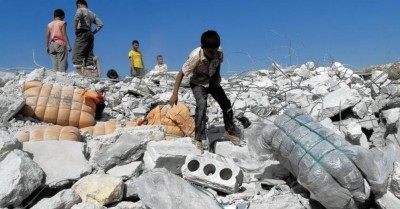US Relaxing Standards for Killing Civilians in Iraq and Syria
Obama administration official says 2013 reforms to reduce civilian deaths in covert drone strikes do not apply to expanding war against ISIS

The rubble of a home reportedly hit by a U.S.-led coalition airstrike in Kafar Daryan in Syria. (Photo: Sami Ali / AFP/Getty Images)
The Obama administration has admitted that it is relaxing its standards for avoiding civilian deaths when it comes to ongoing air bombardments on Iraq and Syria.
Yahoo News reported Tuesday that Caitlin Hayden, a spokesperson for the National Security Council, told the news outlet that a standard imposed last year by President Obama, which requires “near certainty” that civilians will not be harmed in drone strikes, does not apply to the expanding war on Islamic State (ISIS) targets in Iraq and Syria.
Journalist Michael Isikoff reports:
The “near certainty” standard was intended to apply “only when we take direct action ‘outside areas of active hostilities,’ as we noted at the time,” Hayden said in an email. “That description — outside areas of active hostilities — simply does not fit what we are seeing on the ground in Iraq and Syria right now.”
Hayden added that U.S. military operations against the Islamic State (also known as ISIS or ISIL) in Syria, “like all U.S. military operations, are being conducted consistently with the laws of armed conflict, proportionality and distinction.”
It is impossible to verify the impact of Obama’s 2013 drone strike reforms on civilian deaths and wounds, because U.S. drone attacks are shrouded in near complete secrecy. Furthermore, the impact of drones extends far beyond killings and physical wounds, to include psychological trauma and economic devastation.
But the best public information that does exist, provided by the UK-based Bureau of Investigative Journalism, finds that, following the 2013 changes, civilians in Yemen continued to die in U.S. drone strikes, with no civilian deaths reported in Pakistan. However, the causal relationship between the rule change and the number of recorded deaths is not clear, in a drone war where loss of life fluctuates and is difficult to calculate.
What is clear, say critics, is that the rolling back of these limited reforms with regard to Iraq and Syria will be certain to risk the killing of ordinary people already under siege by ISIS.
“They are going back to the pre-reform policy in Pakistan and Yemen,” Robert Naiman ofJust Foreign Policy told Common Dreams. “Why are they doing that? They are sending a message in the ISIS controlled area: ‘Screw you.’ They are saying, ‘We have a list of bad guys, and that’s who we’re trying to kill. If you don’t want to die, get away from our target.'”
As Common Dreams reported earlier this week, reports are emerging of civilian deaths in Iraq and Syria, which the U.S. military has repeatedly denied.

